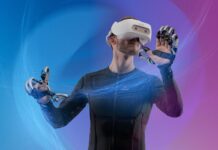VR and AI to Revolutionize Post-Traumatic Stress Disorder (PTSD) Care With emteq labs and Niceday PSYCH-AID Project
emteq labs and NiceDay Nederland have joined forces to transform psychological trauma care with PSYCH-AID, a project to create an AI-based mental healthcare platform E-PTSD.
The partnership aims to revolutionize Post-Traumatic Stress Disorder (PTSD) care for people who suffered from trauma with the development of E-PTSD, a digital mental health platform. The platform will connect patients and therapists for real-time using digital monitoring, smart AI-based analytics, PTSD management tools including adaptive EMDR (Eye Movement Desensitization and Reprocessing) using virtual reality.
Post-Traumatic Stress Disorder (PTSD) is a global health problem, 70% of the world’s population will be exposed to one or more traumas in their lifetime. After experiencing a traumatic event, the human self-preservation mechanism can switch to permanent alert, which can impact a person’s mental and physical health. This permanent alert status continuously sends trauma-related cues to the brain and can lead to mental and/or physical dysfunction. Which in turn can lead to a mental health condition known as Post Traumatic Stress Disorder (PTSD). Some of its symptoms include hallucinations, nightmares, distress, feelings of detachment and isolation from family and friends. In turn PTSD can lead to a major
depression, anxiety disorder, substance abuse or even suicide. It is estimated that mental disorders will cost the global economy €16T by 2030.
EMDR is a recognized evidence-based form of psychotherapy for treating people who are living with PTSD. The therapy requires the person to recall a specific traumatic event, whilst a therapist directs eye movements or sounds from one ear to the other as a physical distraction. However, due to long waiting lists and poor accessibility, access to trauma care can take up to a year in the UK currently. To address this unmet need, the PSYCH-AID project will allow people to receive EMDR remotely using the emteq labs virtual reality platform.
The E-PTSD platform will also be unique in its ability to measure multiple parameters in a continuous way over the duration of the treatment. It will incorporate emteqPRO (an integrated biofeedback platform) that provides proprietary sensor technology to measure emotions through facial gestures and biometric responses and enables adaptive EMDR features and eye-tracking. By integrating biofeedback sensing via E-PTSD, interventions can be personalized to the specific needs of each individual to ensure the treatment is as effective as possible. Moreover, it will leverage NiceDay’s smart patient monitoring and analytical tools to provide real-time support. Bringing all of these features together, the introduction of E-PTSD will initiate a next generation in digital mental healthcare and enable rapid uptake by healthcare professionals of mental healthcare organizations.
Jan Peter Larsen CEO of NiceDay, Netherlands said of the collaboration: “Technology makes it possible to provide more personal and effective support in the recovery of people with mental health complaints. By looking at where technology can bring added value and how to best implement it at institutions, we can create real impact.”
“Objective measurement of the digital biomarkers of emotional response to treatment may well be a game changer for improving the delivery and management of remote therapy,” Graeme Cox, Co-founder and CEO of emteq labs comments. We are looking forward to working with NiceDay Nederland in this important project.”


